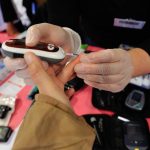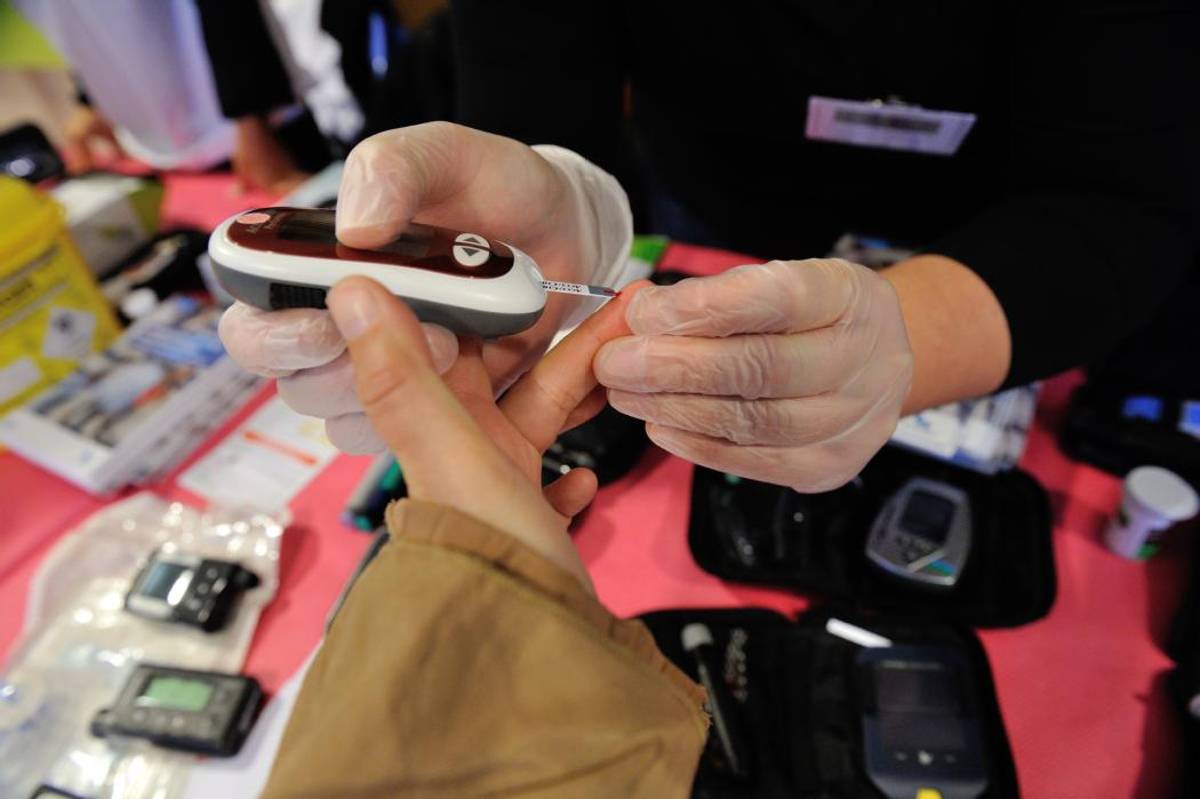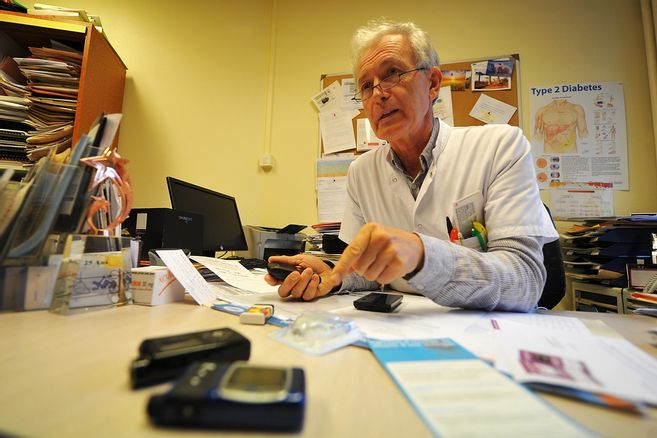

On the occasion of World Diabetes Day, organized this Thursday, November 9 in the Auzelou room, in Tulle, some details on this chronic disease which affects more and more people, younger and younger.
“We live better and better, longer and healthier with diabetes if we take care of it. You have to want it. » Dr Haulot is a diabetologist and endocrinologist at the Tulle hospital center. If the prevalence of this disease increases, treatments and care methods improve.
Several hundred patients are followed at the Tulle hospital center, a third are from outside Corrèze. Around 90% have type 1 diabetes, 10% have type 2 diabetes. “The diabeto services are running smoothly! », he notes.
More cases of diabetes from year to year. “Both types of diabetes, type 1, insulin-dependent, and type 2, caused by insulin resistance linked to an excess of fat in the blood, are increasing,” notes Dr. Haulot. For type 1, “there has been an explosion for 30 years. It has appeared more and more among young people and children over the past 20 years, which proves that environmental factors play a role. »
“But it is type 2 diabetes that is developing the most, for reasons of the health and diet environment. We eat poorly, he notes. Particularly too many ultra-processed foods. At the same time, we practice less and less physical activity; it has been divided by twenty in 100 years. »
Aggravating factor, “care is deteriorating, access to care is more difficult, screening is reduced, which leads to poorer patient care. Increasingly, people with diabetes are very unbalanced upon arrival at the hospital. »
Consequences which can be dramatic. For type 1 diabetes, “the main damage affects the eyes, kidneys and nerves. The leading cause of blindness in France is diabetes. » For type 2 diabetes, the risks are primarily cardiovascular; arterial aging leads to heart attacks, arteritis of the lower limbs, stroke, etc., because they combine the risks. »
Knowing that the human body keeps the memory of past imbalances. “Hence the importance of balancing diabetes as quickly as possible and for as long as possible,” insists Dr. Haulot.
Living with diabetes can be learned. But, he continues, “you can live with your diabetes as best as possible. 102 years ago, insulin was discovered. Today, we are at the stage of artificial intelligence; the pharmaceutical industry has taken up this issue, because it is interesting for them. Ultimately, we will be able to offer completely autonomous insulin pumps. » Screenings will be offered throughout the day.
Screenings will be offered throughout the day.
Less stress for patients
He continues: “In terms of blood sugar balance, we have gained a lot. Today, patients are 80% to 90% within the target and there is almost no risk of hypoglycemia. In terms of quality of life too, there is a significant gain, patients experience much less stress in managing their diabetes. »
In addition to these therapeutic advances, there are those related to patient care. Initiated in the 90s, implemented at the Tulle hospital, for adults since 2005 (2015 for children), functional insulin therapy teaches people to manage their diabetes in a less restrictive way than according to the initial doctrine. “This has provided greater freedom by giving them the tools to eat what they want with adaptive insulin doses.” »
And Dr Haulot concludes: “Nutritional and physical hygiene is the basis of care. »
Is type 2 diabetes the disease of the century?
A day to talk about diabetes
ADIACOR, the Association for Diabetics of Corrèze, brings together some 120 members. “We try to send super positive messages, because we know that diabetes is complicated. You really have to be an actor in your health to feel good about yourself,” explains Catherine Vieillefont, public health facilitator at the Tulle hospital center and secretary of ADIACOR.
This Thursday, November 9, from 10 a.m. in the Auzelou room, in Tulle, with the diabetology department of the hospital center, she is participating in World Diabetes Day, on the theme “diabetes, finding the keys to prevent it, understand it and bounce back. »
Proof of the importance of education in the management of this disease, CE2, CM1 and CM2 students from the Orliac-de-Bar and Saint-Mexant schools will participate, in the morning, in a sensitive journey in the company of two chefs. On the menu: a journey of the senses, tastings (autumn vegetable soup, mushroom macaroons, vegetable chips, chocolate and zucchini cake), a nutrition quiz with sports challenges.
Theater and cinema
Throughout the day, workshops will allow you to discover a range of physical activities: adapted gym and gentle gym, qi gong, yoga; workshops also for plantar massage, dietetics or screening. Many professionals will be there to answer questions from families and patients and present the available material; the CPAM will provide information on the SOPHIA system. The play “White Flags” tells the daily life of families faced with diabetes.
The play “White Flags” tells the daily life of families faced with diabetes.
At 10:30 a.m., screening of the film Nightlight mothers, by Vanessa Gauthier, on the daily lives of two mothers whose children suffer from a chronic illness. At 4 p.m., theater with The white flags by the troupe The theater of the stars; the third part of Desert Islandsin which two mothers of diabetic children recount their journey since being diagnosed with the disease. The white flags evokes the transition from adolescence to adulthood. Play and film will be followed by time for lively discussions.
Several topos and conferences will be presented by specialists: from 2 p.m. to 3 p.m., “Physical activity and diabetes”, by physiotherapist Christian Bregere and “Hybrid loops”, by Dr Jean-Pierre Haulot; finally, at 6:30 p.m., “From overeating to restriction, a whole story of balance”, by Professor Pierre Jésus.
This day is open to all, access is free.
ADIACOR also organizes, each year, two easy walks, of 6-8 km, and one more difficult hike. The opportunity to practice physical activity, make cultural discoveries and meet people outside the hospital structure, appreciates Catherine Vieillefond. She buys equipment to improve the lives of patients in the diabetology department. Contact: 05.55.29.87.37.
Blandine Hutin-Mercier

